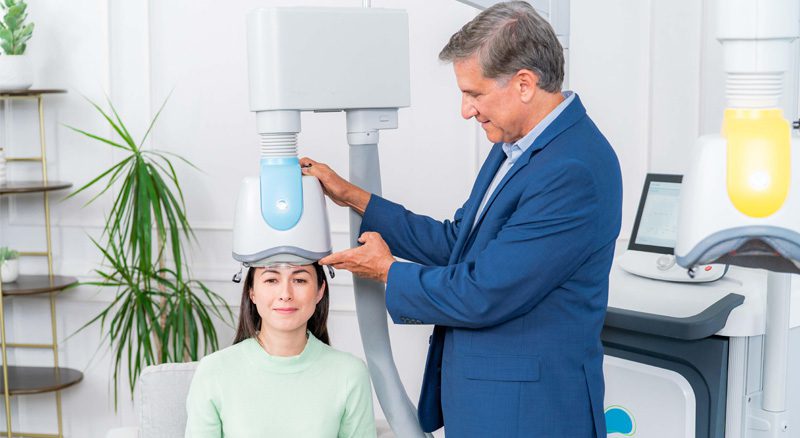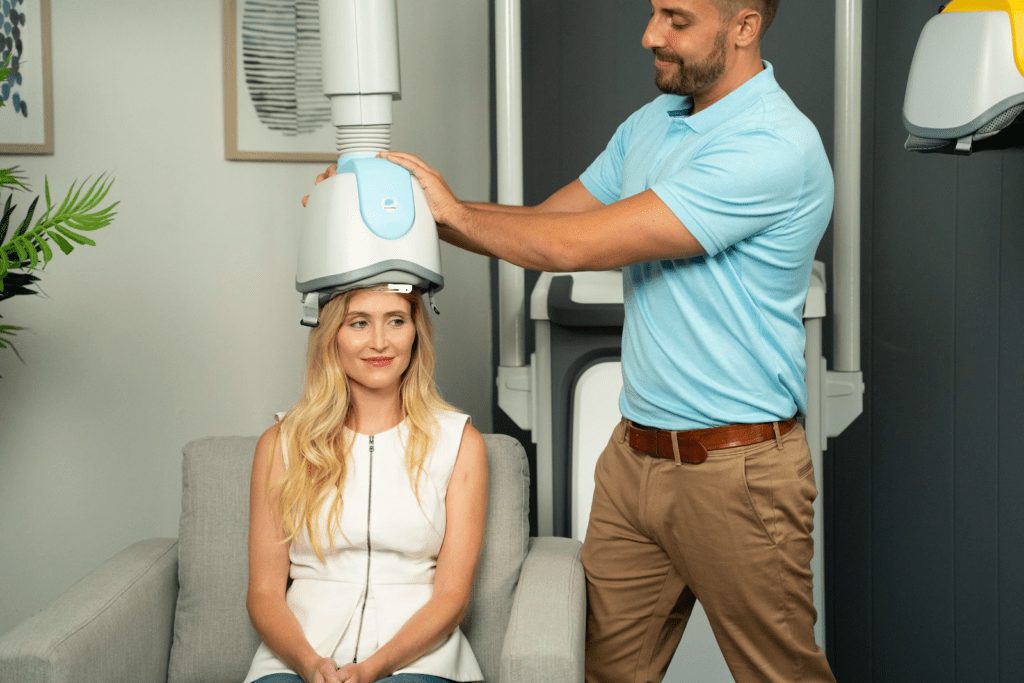
Treatments
BrainsWay’s treatment platform is based on a unique breakthrough technology called Deep TMS, which can reach significant depth and breadth of the brain and produce broad stimulation and functional modulation of targeted brain areas.
Deep TMS treatment features unique, patented coils that are fitted into a helmet, which is secured snugly to the patient’s head during the treatment. BrainsWay’s therapy has been utilized in over 60 clinical trials worldwide. In the U.S., the company’s device has been FDA cleared for the treatment of Major Depressive Disorder (MDD) since 2013, FDA cleared (De-Novo) for the treatment of Obsessive Compulsive Disorder (OCD) since 2018, FDA cleared as an aid for short-term Smoking Cessation since 2020, and has now received an expanded indication for Anxious Depression.
Deep TMS utilizes electromagnetic fields to safely and effectively regulate the neural activity of brain structures found to be related to the targeted mental health or neurological condition. As the treatment progresses, the relevant symptom’s conditions become less frequent and less severe, allowing the patient to experience and enjoy a better quality of life.
During a Deep TMS session, a cushioned helmet holding the treatment’s patented H-Coil technology is placed upon the patient’s head. The helmet is positioned to allow the optimal targeting of the sought-after brain structures, before the device itself is turned on. As the device is activated, its electromagnetic fields are sent to regulate the activity of the relevant structures across relatively wider areas of the brain, compared to the original, traditional TMS devices that preceded it. This allows Deep TMS to avoid the targeting issues that sometimes arise during traditional TMS sessions. Deep TMS is also able to directly regulate structures found in deeper, harder-to-reach areas of the brain, thereby increasing the treatment’s overall efficacy.

As a non-invasive form of medical device treatment, Deep TMS has, in most cases, minimal, temporary side effects. The most common side effect to this treatment is a local and passing headache at the treatment site, which normally passes on its own after the first few treatment sessions. Over-the-counter headache medication can also be used to counter this temporary effect. Additional, less frequent side effects include muscle twitching and jaw pain. A small fraction of patients experience scalp sensations or facial twitching, but these, too, usually go away after the first few sessions, and can dissipate following adjustments to the helmet’s position and stimulation settings made to the device.
It should also be noted that Deep TMS does not include the significantly more severe side effects that often arise from other forms of medical treatment for mental health disorders: the possible side effects of antidepressant medication, for instance, include nausea weight gain, loss of sexual desire and sexual dysfunction, while electroconvulsive therapy (ECT) can cause short-term memory loss.
Due to its multiple advantages, Deep TMS can likely benefit a number of different populations:
Deep TMS has been FDA-cleared in the US due to its ability to safely and effectively treat:
It has also been CE-marked in Europe to safely treat these and a number of other conditions, namely:
Treatment-resistant patients are another group who can benefit from Deep TMS. In fact, a 2015 multicenter study published in World Psychiatry concluded that one out of three patients facing treatment-resistant depression achieved remission after undergoing four weeks of the Deep TMS treatment’s acute phase. 80% of patients who did not immediately respond to this treatment experienced an improvement later on, during the continuation phase. Deep TMS was found to have an even greater effect within a real-life setting: specifically, a study relying on the data of over 1000 participants treated for depression found that roughly 75% achieved a positive clinical response following Deep TMS, with one out of two participants achieving remission.
Patients who wish to rely on non-invasive, clinically-backed mental health treatments are also likely to benefit from this treatment. In fact, it is its non-invasive nature that allows Deep TMS to avoid the above-mentioned side effects that invasive treatments can entail.
Relying on its own, patented H-Coil technology allows Deep TMS to forgo the use of anesthesia and avoid a lengthy recovery period. As a result, its treatment sessions can be incorporated into the patient’s daily schedule, with the patient able to drive themselves from the treatment center following each session.
Deep TMS can also be incorporated into existing treatments, for an extra boost in efficacy. As such, patients already treated with medication can add Deep TMS to their treatment regimen, with many reporting a better overall effect on their targeted condition.
Indication for Use: “The Brainsway Deep TMS™ System is indicated for the treatment of depressive episodes in adult patients suffering from Major Depressive Disorder who failed to achieve satisfactory improvement from previous anti-depressant medication treatment in the current episode.”
Indication for Use: “The Brainsway Deep Transcranial Magnetic Stimulation System is indicated to be used as an adjunct for the treatment of adult patients suffering from Obsessive-Compulsive Disorder.”
Indication for Use: “The Brainsway Deep Transcranial Stimulation System is indicated to be used as an aid in short-term smoking cessation for adults.”
Indication for Use: “The Brainsway Deep TMS System is indicated for the treatment of depressive episodes in adult patients suffering from Major Depressive Disorder who failed to achieve satisfactory improvement from previous anti-depressant medication treatment in the current episode.”
Indication for Use: “The BrainsWay Deep TMS System is indicated for the treatment of depressive episodes and for decreasing anxiety symptoms for those who may exhibit comorbid anxiety symptoms in adult patients suffering from Major Depressive Disorder (MDD) and who failed to achieve satisfactory improvement from previous antidepressant medication treatment in the current episode.”
Learn more about how BrainsWay’s innovative TMS treatment technology can be effective in treating psychiatric disorders.
Depression is a neuropsychiatric disorder that is expressed in emotional, physiological, and behavioral effects
BrainsWay Introduces the First FDA Cleared (De-Novo), Non-invasive, Medical Device for the Treatment of OCD
BrainsWay Introduces the First FDA Cleared, Noninvasive, Medical Device in the addiction space for aiding short-term smoking cessation in adults
Deep TMS is the only TMS system FDA-cleared to reduce comorbid anxiety symptoms in adult patients with depression
Bipolar disorder, also known as manic-depressive illness, causes unusual shifts in a person’s mood, energy, and ability to function
Post-traumatic stress disorder (PTSD) is an extreme anxiety response to a life-threatening situation
Anti-psychotic medications are often effective for the positive symptoms of schizophrenia
Learn more about how BrainsWay’s innovative TMS treatment technology can be effective in treating neurological disorders.
Alzheimer's disease is a major cause of severe cognitive decline in the aged.
Autism is a complex developmental disability that typically appears during the first three years of life
Neuropathy is common in the diabetic population, affecting approximately 50% of patients with long-lasting diseases.
Multiple Sclerosis (MSc) is an inflammatory demyelinating condition of the central nervous system
Parkinson's disease is a degenerative disorder of the central nervous system
A brain stroke is the loss of brain function due to a disturbance in the blood supply to the brain.